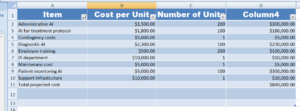Introduction
This week you will finalize your Excel file and do some analysis based on the data you have provided for your research. Make sure to pay close attention to the readings and videos since these are usually new concepts that take some time to understand.
Learn
Textbook Reading
Below you will find the textbook reading for the week. Remember to complete your reading by Wednesday to be prepared for the week!
Microsoft Office 2016 at work for dummies (Links to an external site.)
- Sorting & Filtering – Chapter 10
- Quick Analysis Tool – Chapter 8
- Conditional Formatting – Chapter 9
- IF Function – Chapter 8
- Pivot Tables (Links to an external site.)
- Charts – Chapter 11
- Cell borders, shading, and formatting – Chapter 9
Apply
Required Resources
The following resources will be used to complete your assignment:
- Microsoft Excel
You will analyze the data you collected and provided in your assignment last week. As you are working on each of the steps below, think about the analysis that you will provide to the research team. Follow the steps below to complete this analysis.
- Copy the file you created in week 5 and rename the new one “YourName_COMP150_W6_Assignment”.
- Open the file and duplicate the sheet where the initial table and data were created
- Rename the new sheet as “sorting & filters” and move it to the right of the original sheet
- Make the data look professional by using formatting options such as borders and table styles to place the data into a table.
- Select one of the text-based data columns such as names, cities, or addresses and sort the data by Z to A.
- Create a custom filter to any part of the data except where you did the sort. For example, if you sorted by patient’s name, then filter another set of data.
- Duplicate the original sheet again and rename it as “conditional formatting”. Move it right after the “sorting & filters” sheet.
- Implement conditional formatting to any of the number-based data sets. For example, showing higher numbers in green, while showing lower numbers in red.
- Add an IF function and apply it to the entire set. For example, you could create a function that says if x number is higher than x number, then you are at risk. The purpose is to show how an IF function works so creativity it is permitted in how you use the function.
- Use the “conditional formatting” sheet to create a pivot table.
- The pivot table needs to be on its own sheet.
- The pivot table needs to be meaningful so make sure to select data that will make it clear for your analysis.
- The pivot table should have data selected on the columns, rows, and values fields. Make sure to consider the data when adding the values selection
- Create a minimum of two charts. Make sure to select the right chart that explains your analysis. Each chart should be on its own sheet and should have a title. Make sure the purpose of the chart is self-explanatory just by looking at it.
- Update the documentation sheet
- Update the date.
- Add all the new rows for the sheets created.
- Provide a brief written analysis for each of the new sheets. Explain what you want the research team to learn about each sheet.
- Review all the sheets to ensure it looks professional. Try to keep the same style, colors, and formatting, Make sure the file is named “YourName_COMP150_W6_Assignment” and submit the file
Solution:

Please click the icon below to purchase full answer at only $15
